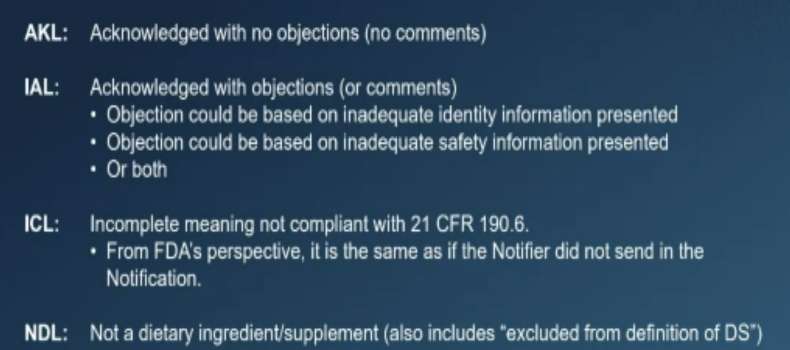In US, Does NDI Indicate ‘Not Delivering Innovation’ Rather Than ‘New Dietary Ingredient’?
Reasons Clear For Gridlock On FDA’s Notification Requirement, Solution Remains Murky
Executive Summary
Why stakeholders have many questions and why so many ingredients that weren’t cleared by FDA are rampant in the US are questions at the heart of resolving disagreement between the industry and the agency over regulation both sides acknowledge is biggest impediment to market growth.
The number of questions the US Food and Drug Administration’s new dietary ingredient notification generates is large and growing but is dwarfed by the number of new ingredients added to dietary supplements since the rule was established, most without being notified.
Why stakeholders have so many questions and why new ingredients that should have but weren’t cleared by the FDA are rampant in the US are questions at the heart of resolving a disagreement between the industry and the agency over a regulation that both sides acknowledge is the biggest impediment to market growth.
At a regulatory conference conducted online by supplement industry trade groups on 13 July, an FDA official and a food and drug attorney who previously worked at the agency attempted to explain a path to easing the gridlock while also acknowledging problems in the way.
The agency’s Office of Dietary Supplement Programs encourages all questions about NDI notifications but also wants industry stakeholders to know that the number and variety of substances proposed for use in supplements as NDIs weren’t anticipated by the Dietary Supplement Health and Education Act, says Greg Noonan, acting ODSP deputy director.
 FDA's office of dietary supplement programs sends these types of letters to Ndi notifiers.
Source: screenshot
FDA's office of dietary supplement programs sends these types of letters to Ndi notifiers.
Source: screenshot
When Congress passed the act in 1994, on the other hand, lawmakers likely expected the FDA to keep pace with innovations in the market and to encourage innovation by prioritizing NDI notification reviews and confirming when a notification filer should have market exclusivity for an NDI, says attorney Robert Durkin, of counsel at Washington firm Arnell Golden Gregory LLP.
While Noonan discussed the time- and resource-intensive processes that ODSP must use in evaluating NDI notification, or NDINs, and the improvements the office targets, Durkin discussed the industry’s frustration with the agency’s NDIN work.
An NDI-containing product can be launched without an FDA response if the agency doesn’t respond within 75 days, but the agency has authority to order off the market products it determines contain ingredients that should have been the subjects of notifications, or that were reviewed in notifications that did not succeed.
A draft guidance published in 2011 was widely criticized by the industry, and by its chief allies in Congress at the time, and a revised draft published in 2016 did little to bridge the gap between stakeholders' argument on what DSHEA requires in an NDIN and the agency's thinking. (Also see "NDI Notifications Take Center Stage In FDA's Evaluation Of DSHEA" - HBW Insight, 10 Apr, 2019.)
 odsp acting deputy director greg noonan: “The goal to is to get everyone to an AKL."
Source: FDA
odsp acting deputy director greg noonan: “The goal to is to get everyone to an AKL."
Source: FDA
In a a list of food program guidance documents it expects to publish as drafts or finals by the end of June 2022 the FDA recently released, it included, “Policy Regarding Certain New Dietary Ingredients and Dietary Supplements Subject to the Requirement for Pre-market Notifications; Draft Guidance for Industry.”
DSHEA ‘Not Written For’
Noonan, appointed to the ODSP post in August 2020, and Durkin noted probiotics and enzymes as types of ingredients that probably weren’t expected to emerge for use as NDIs when Congress passed the act. Those ingredients’ uses as dietary ingredients also are new to the FDA, which means that ODSP decisions on some NDINs will take longer than others, and clearances for the proposed use, “acknowledgement letters,” or AKLs, might not come at all.
There are things “DSHEA was not really written for,” Noonan said in response to a question on NDINs.
Durkin allowed that even with Congress expecting any dietary ingredients not present in the US food supply before DSHEA was passed would be subject to the NDIN requirement, lawmakers could not have anticipated the breadth of changes in the market.
“Enzymes and probiotics are very much players in the supplement space now. But they don't quite fit DSHEA. They're different than the ingredients that were envisioned back in ‘94 when DSHEA was being written,” he said during his presentation.
‘Goal To Get Everyone To An AKL’
“The goal, the intent of the people who do the NIDN reviews, is not to limit access to market or to issue” inadequate letters (IALs) or not a dietary ingredient letters (NDLs) to filers, Noonan said. “We work actually quite diligently with the notifier.”
“The goal to is to get everyone to an AKL and I think that speaks to the idea of innovation.”
Durkin, whose posts at the FDA included director of the Division of Dietary Supplement Programs and acting director after the division became ODSP, doesn’t doubt that the agency’s intent in NDIN reviews is to facilitate making additional ingredients available for use in supplements. He also gives ODSP kudos for being open to questions from stakeholders before they file NDINs.
“While I was there, we felt it was better to work with the notifier to get a complete notification. That way to enable our toxicologists and our chemists to really make a safety determination based on the meat of the notification, the actual science,” he said in his presentation.
Communication, before an NDIN is filed and during ODSP’s evaluation, helps both the filer and the agency, Durkin added.
“The ingredients, the manufacturing processes are just growing more and more sophisticated. As you struggle and you endeavor to understand them yourself for your own ingredient, FDA is doing the same thing. They might have questions; they might ask for some direction.”
Comprehensive understanding of an NDIN is needed not only for determining whether a filer gets an AKL from ODSP. An ingredient’s safety and compliance are monitored in the marketplace, too.
 Robert durkin: Some ingredients are "different than the ingredients that were envisioned back in ‘94 when DSHEA was being written.”
Soure: Arnell Golden Gregory
Robert durkin: Some ingredients are "different than the ingredients that were envisioned back in ‘94 when DSHEA was being written.”
Soure: Arnell Golden Gregory
“They want to review your safety. They want to know what your safety is. So that if there's a problem, they're in better position to make an adulteration charge,” Durkin said.
‘Until The Regulator Steps In’
For all the agency wants to know from NDIN filers and all the work it puts into the evaluations, it’s letting the down the market, he observed in response to a question. There’s a reason the large majority of NDIs used in supplements available in the US haven’t been notified to the FDA.
“If it was done correctly, if there was enforcement and there was exclusivity or protection, it would definitely increase the value of the NDIN,” Durkin said.
Acknowledging that some businesses may skip filing NDINs to avoid revealing proprietary information or trade secrets to their competitors, he said notifications can be made with redacted commercial confidential information such as manufacturing technologies and ingredient studies.
Still, protection in the marketplace that NDIN filers can establish for themselves, predominantly through intellectual property litigation, should be an auxiliary to what the FDA should provide, he says.
“I think you can leverage that with your intellectual property and your overall strategy, you increase your opportunity to manufacture those ingredients longer. But until there’s some way to protect that investment, other than relying on civil litigation, until the regulator steps in and basically does what they’re supposed to do the value is very questionable,” Durkin said.
‘Risk Making A Notification?’
Any responsibility for the FDA to enforce market exclusivity for NDIs that received AKLs isn’t supported by the ODSP. The previous director, Steven Tave, said in 2020 that while the agency agrees with the industry that compliance with the NDIN requirement should increase, the FDA isn’t on the hook for protecting filers’ investments by forcing off the market other products with the same ingredient sold by other firms. (Also see "In US, Market Exclusivity For NDI Notifications ‘Just Not There’ In DSHEA Regulation" - HBW Insight, 25 Sep, 2020.)
In his presentation, Durkin noted an estimate Tave made that the FDA had received less than 1,200 NDIN in the more than 25 years since Congress passed DSHEA and estimates that four times as many should have been submitted.
“There are thousands of new dietary ingredients on the market, that should have an NDIN,” he said. And of the some 1,200 NDINs filed, “even less are for unique ingredients.”
However, in addition to not having market exclusivity for successful NDINs and even though the ODSP is open to questions, supplement firms are discouraged by a lack of clarity on information needed to show a reasonable assurance of safety for an ingredient’s intended use, the agency’s bar for sending AKLs to filers.
“If you look at the data, simply less and less are being filed,” Durkin said, adding, “Based on uncertainty about what a successful notification is, do you really want to risk making a notification?”
Noonan and Durkin spoke at a conference conducted by the American Herbal Products Association, Consumer Healthcare Products Association, Council for Responsible Nutrition, Natural Products Association and United Natural Products Alliance. (Also see "US Rule For Mandatory Supplement Registration Would Likely Give FDA Authority For Fines" - HBW Insight, 14 Jul, 2021.)
